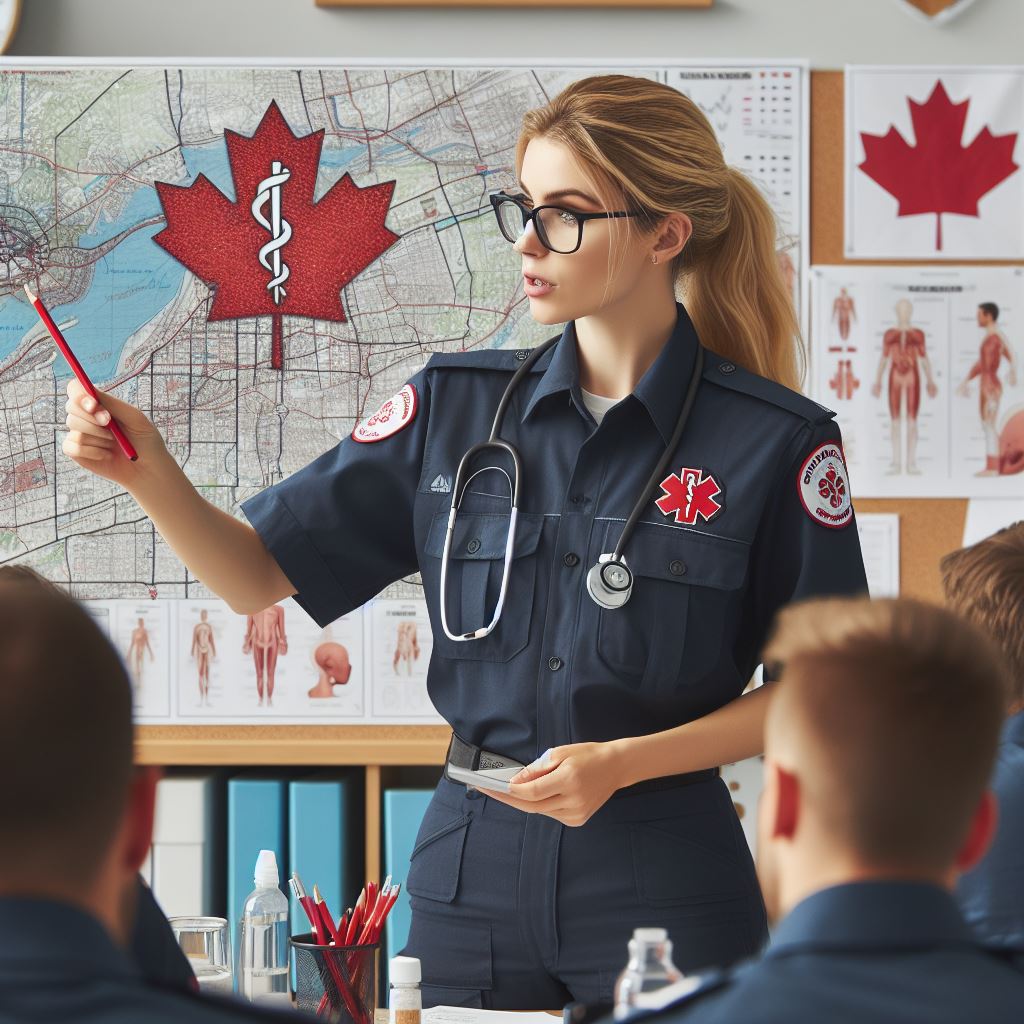Introduction
A. Importance of paramedics in Canada
In Canada, becoming a paramedic can be a rewarding career choice with significant importance.
Paramedics play a crucial role in providing immediate medical care to those in need.
B. Overview of the role and responsibilities of paramedics
The role of a paramedic is diverse, dynamic, and demanding. They are responsible for assessing, treating, and stabilizing patients in various emergency situations.
They also transport patients to medical facilities while providing continuous care and support.
C. Brief mention of the steps to become a paramedic in Canada
To become a paramedic in Canada, there are specific steps you need to follow.
Firstly, you must complete a recognized paramedic educational program accredited by the Canadian Medical Association. This program includes both classroom and practical training.
After completing the education program, you must obtain certification from the National Association of Emergency Medical Services Educators (NAEMSE).
This certification ensures that you meet the required national standards for paramedics.
Next, you need to become licensed by the appropriate provincial or territorial licensing authorities.
Each province or territory has its own licensing requirements, which may include passing a licensing exam and meeting certain medical and background check criteria.
Once you are licensed, you can start applying for paramedic positions in various settings, such as ambulances, hospitals, or fire departments.
Paramedics in Canada have the opportunity to work in urban or rural areas, providing vital healthcare services to their communities.
In essence, becoming a paramedic in Canada involves completing a recognized paramedic educational program, obtaining certification, becoming licensed, and finding employment.
Paramedics contribute greatly to the healthcare system by providing immediate care and support to those in need.
If you have a passion for helping others and thrive in high-pressure situations, a career as a paramedic may be right for you.
Educational Requirements to Become a Paramedic in Canada
Embarking on a career as a paramedic in Canada is a noble pursuit, demanding dedication and a solid educational foundation.
Here’s a concise guide to the essential educational requirements:
1. High School Diploma or Equivalent
Securing a high school diploma or its equivalent is the foundational step towards a paramedic career.
This ensures a basic educational threshold for aspiring paramedics.
2. Completion of a Recognized Paramedic Program
Enrolling in a recognized paramedic program is crucial.
These programs equip students with the necessary knowledge and skills required for the dynamic field of pre-hospital care.
3. Options for Diploma or Degree Programs
Paramedic education in Canada offers diverse pathways, including diploma and degree programs.
Prospective paramedics can choose programs that align with their career goals and educational preferences.
4. Importance of Selecting an Accredited Program
Opting for an accredited paramedic program is paramount.
Accreditation ensures that the program meets stringent standards, guaranteeing a high-quality education that aligns with industry requirements.
Unlock Your Career Potential
Visualize a clear path to success with our tailored Career Consulting service. Personalized insights in just 1-3 days.
Get Started5. Considerations for Selecting a Suitable Program in Canada
When choosing a paramedic program in Canada, there are several factors to consider:
- Reputation and Reviews: Research the reputation of paramedic programs. Seek reviews from current or former students to gain insights into the program’s strengths and weaknesses.
- Clinical Experience Opportunities: Look for programs that emphasize hands-on experience. Clinical placements are invaluable for applying theoretical knowledge in real-world scenarios.
- Accreditation Status: Confirm the accreditation status of the paramedic program. Accredited programs are recognized by regulatory bodies and employers, enhancing job prospects upon graduation.
- Faculty Expertise: Assess the expertise of the faculty members. Experienced instructors contribute significantly to the depth and quality of paramedic education.
- Career Support Services: Consider programs that offer career support services. Assistance with job placement, resume building, and interview preparation can facilitate a smooth transition into the workforce.
By carefully evaluating these factors, aspiring paramedics can select a program that aligns with their goals and needs.
In general, to become a paramedic in Canada, individuals must have a high school diploma or equivalent and complete a recognized paramedic program.
There are various diploma and degree programs available, and it is essential to choose an accredited program.
Considerations when selecting a program include accreditation, curriculum, clinical experience, faculty qualifications, cost and location, and career services.
By fulfilling these educational requirements and selecting a suitable program, aspiring paramedics can embark on a fulfilling and rewarding career in Canada.
Certification and Licensing
Embarking on a career as a paramedic in Canada involves navigating a structured certification and licensing process.
Here’s a comprehensive guide:
A. National Occupational Competency Profile (NOCP)
- Familiarize yourself with the NOCP, a framework outlining the skills and competencies expected of a paramedic.
- Tailor your education and training to align with the NOCP standards for paramedic practice.
B. National Certification Process through COPR
- Engage in the national certification process facilitated by the Canadian Organization of Paramedic Regulators (COPR).
- Successfully complete the entry-to-practice examination to validate your competence at the national level.
C. Provincial Licensing Requirements and Processes
- Research and understand the specific licensing requirements of the province in which you intend to practice.
- Submit the necessary documentation, including proof of education, certification, and examination results, to obtain your provincial license.
D. Continuing Education and Professional Development
- Embrace a commitment to continuous learning by participating in ongoing education and professional development opportunities.
- Stay informed about advancements in paramedicine through workshops, conferences, and relevant courses to enhance your skills.
Navigating the certification and licensing journey demands a proactive approach.
Ensure that you adhere to both national and provincial requirements, staying dedicated to your professional growth.
The pursuit of excellence in paramedicine involves not only obtaining initial certifications but also embracing a lifelong journey of learning and development.
Relevant Skills and Experience
In order to become a paramedic in Canada, there are several relevant skills and experiences that are highly beneficial in this field:
A. Strong communication and interpersonal skills
Paramedics are often the first point of contact in emergency situations.
Effective communication with patients, their families, and other healthcare professionals is critical in delivering care.
B. Ability to handle high-pressure situations
Paramedics must be able to remain calm and composed in high-pressure and stressful situations, making quick and informed decisions to provide emergency medical care.
C. Physical fitness and stamina
The role of a paramedic requires physical exertion, including lifting and carrying patients, often in challenging environments.
Maintaining physical fitness and stamina is important to perform the duties effectively.
D. Problem-solving and critical thinking abilities
Paramedics encounter various medical emergencies that require critical thinking skills to quickly assess and analyze situations, and implement appropriate treatment plans.
E. Experience in healthcare or emergency services settings
Having previous experience in healthcare or emergency services settings, such as working as a nurse, firefighter, or in a related field, can provide valuable knowledge and enhance the understanding of the paramedic role.
F. Volunteer work and extracurricular activities that demonstrate commitment and relevant skills
Engaging in volunteer work or participating in extracurricular activities related to healthcare or emergency services illustrates dedication, teamwork, and a genuine interest in helping others, which are qualities valued in the paramedic profession.
While these skills and experiences are not mandatory requirements to become a paramedic, they can significantly enhance employment opportunities and contribute to a successful career in the field.
Employers often seek individuals who possess a well-rounded skill set and a genuine passion for helping others.
Continuous learning and professional growth are also essential in the paramedic profession.
Paramedics in Canada are required to participate in ongoing training and education to stay updated with the latest medical advancements and best practices in emergency medical care.
In a nutshell, becoming a paramedic in Canada requires a combination of relevant skills and experiences.
Strong communication and problem-solving abilities, along with physical fitness and experience in healthcare or emergency settings, are highly beneficial.
Engaging in volunteer work and extracurricular activities can also demonstrate commitment and enhance employability.
Aspiring paramedics should strive for continuous learning and growth to excel in this demanding yet rewarding profession.
Read: Balancing Work and Life as a Canadian Doctor

Clinical and Field Experience
Paramedic programs in Canada require students to complete clinical placements.
These placements provide students with hands-on experience in real-life emergency situations.
A. Required Clinical Placements during Paramedic Programs
Paramedic programs in Canada have specific requirements for clinical placements.
Students must complete a certain number of hours in various healthcare settings.
This includes hospitals, ambulance services, and other healthcare facilities.
B. Importance of Gaining Practical Experience
Practical experience is crucial for becoming a competent paramedic.
It allows students to apply their theoretical knowledge in real-world scenarios.
It also helps students develop critical thinking and problem-solving skills.
C. Opportunities for Volunteer or Part-Time Work as a First Responder
Volunteer or part-time work as a first responder can provide valuable experience.
It allows aspiring paramedics to gain exposure to emergency situations and build their skills.
It also demonstrates a commitment to the field and a willingness to learn.
D. Networking and Building Connections within the Industry
Building a professional network is essential for future job prospects as a paramedic.
Attending industry events, workshops, and conferences can help in networking.
Connecting with experienced professionals can provide guidance and potential job opportunities.
Embarking on the journey to become a paramedic in Canada is not just about acquiring theoretical knowledge.
Practical exposure through clinical placements, volunteer work, and networking plays a pivotal role.
Paramedic programs across the country emphasize the significance of hands-on experience, ensuring that aspiring paramedics are well-prepared for the challenges they might encounter in the field.
These experiences not only enhance skills but also contribute to the development of a well-rounded and competent paramedic.
So, while mastering the academic side of paramedic training is vital, aspiring paramedics in Canada should actively seek and engage in opportunities that allow them to apply their knowledge in real-world scenarios, fostering a holistic approach to their education and future career.
Read: The Future of Medicine in Canada: Trends & Predictions
Licensing Examinations
A. Overview of the licensing examinations at the provincial level
Each province in Canada has its own licensing examinations for aspiring paramedics.
These exams evaluate the knowledge, skills, and competencies required to practice as a paramedic.
The examinations are designed to ensure that paramedics meet the standards set by the province.
B. Preparation tips and resources
Start studying early and create a plan to cover all the necessary topics.
Utilize textbooks, study guides, and online resources specific to the licensing examinations.
Practice sample questions and take mock exams to familiarize yourself with the format.
Connect with other paramedic students or professionals for study groups or additional support.
C. Importance of studying and staying updated with the latest protocols and guidelines
Paramedics must grasp the latest protocols and guidelines, ensuring optimal patient care. Continuous learning maintains their proficiency.
Professional growth aids in staying current. Regulatory bodies may mandate periodic course completion for paramedics.
In Canada, obtaining a license demands passing provincial exams. Each province administers unique tests evaluating skills and competencies.
Adequate early preparation is essential, covering all topics in a study plan. Valuable tools include tailored textbooks, guides, and online resources.
Practice with sample questions and mock exams is crucial for familiarity and improvement. Connecting with peers or professionals in study groups provides support.
Staying updated with the field is equally crucial during exam preparation. Continuing education through workshops and conferences enhances skills and knowledge.
Some regulatory bodies impose periodic course completion to maintain licensure. These requirements promote lifelong learning and high standards.
In summary, becoming a licensed paramedic involves passing province-specific exams, staying updated, and engaging in ongoing education for competent and knowledgeable care.
Read: Top Canadian Universities for Pharmacy
Job Search and Employment Opportunities
Embarking on a career as a paramedic in Canada offers a myriad of opportunities for those passionate about emergency healthcare.
Here’s a guide to help you navigate the job search and seize advancement possibilities:
A. Utilizing Job Search Platforms
- Explore dedicated paramedic job platforms like Paramedic.ca and EMSjobcentre.ca.
- Leverage general job boards, emphasizing healthcare sections for paramedic openings.
- Stay updated on provincial health authority websites for government-operated positions.
B. Building a Strong Resume and Cover Letter
- Craft a concise and compelling resume highlighting relevant certifications and experience.
- Tailor your cover letter to emphasize your commitment to emergency medical services.
- Showcase any additional skills, such as language proficiency or specialized training.
C. Interview Preparation
- Research common paramedic interview questions and practice concise responses.
- Emphasize your ability to remain calm under pressure and collaborate with a diverse healthcare team.
- Showcase your understanding of the local healthcare system and emergency protocols.
D. Exploring Career Advancement
- Identify specialized areas like critical care or tactical paramedicine for career growth.
- Pursue advanced certifications such as Advanced Care Paramedic (ACP) or Critical Care Paramedic (CCP).
- Network with experienced paramedics to gain insights into potential career paths.
Remember, success in the paramedic field extends beyond technical skills.
Employers value interpersonal skills, adaptability, and a commitment to ongoing learning.
Stay proactive in your job search and open to the diverse opportunities the paramedic profession offers in Canada.
Read: Canadian Pharmacist Licensing Process
Conclusion
Becoming a paramedic in Canada involves several important steps. First, you must obtain your high school diploma and complete any required prerequisites.
Next, you need to enroll in an accredited paramedic program and successfully complete the training.
Once you have completed your training, you must pass the certification exam to become a licensed paramedic.
A career in paramedicine is highly significant in healthcare.
Paramedics play a critical role in saving lives, providing emergency medical care, and stabilizing patients before they reach the hospital.
Their quick thinking, expertise, and dedication make a difference in countless lives every day.
If you are considering a career in paramedicine, I encourage you to pursue it. It is a rewarding field where you have the opportunity to make a direct impact on people’s lives during their most vulnerable moments.
The sense of fulfillment and satisfaction you will experience in helping others is immeasurable.
So, take the necessary steps, obtain the required education and training, and embark on a fulfilling career as a paramedic in Canada.
You will not only save lives but also become an integral part of the healthcare system.




